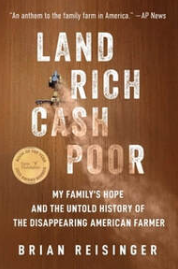|
JULY 27, 2025
|
|
hour 1: "Land
Rich, Cash Poor: My Family's Hope and the Untold,
History of the Disappearing American Farmer" |
|
with Brian Reisinger
|
|
|
|
hour 2:
"The Outlook
for American Economic Growth" |
|
with Phil Kerpen |
|
information for Phil Kerpen's show |
|
|
FULL TWO HOURS
 HOUR 1
HOUR 1  HOUR 2
HOUR 2
 |
|
|
|
hour 1:
Land Rich, Cash Poor: My
Family's Hope and the Untold, History of the
Disappearing American Farmer |
|
About our guest Brian Reisinger |
 Brian
Reisinger, author of
Land Rich, Cash Poor: My Family's Hope and the Untold History of the
Disappearing American Farmer, grew up on a family farm in Sauk
County, Wisconsin and lives to tell the hidden stories of rural
America. A columnist and consultant, Reisinger worked with his
father from the time he could walk, before entering the worlds of
business journalism and public policy. Brian
Reisinger, author of
Land Rich, Cash Poor: My Family's Hope and the Untold History of the
Disappearing American Farmer, grew up on a family farm in Sauk
County, Wisconsin and lives to tell the hidden stories of rural
America. A columnist and consultant, Reisinger worked with his
father from the time he could walk, before entering the worlds of
business journalism and public policy.
He has been published by USA Today, Newsweek, Yahoo News, the
Milwaukee Journal Sentinel/USA Today Network, PBS/Wisconsin Public
Radio’s “Wisconsin Life,” The Daily Yonder, RealClearPolitics, The
Hill, The Wisconsin State Journal, The Cap Times, Saving Country
Music, and many other news, policy, outdoor, and cultural
publications. Reisinger’s writing has won awards from the National
Society of Newspaper Columnists, first place in the Seven Hills
Literary Contest, a Solas Award, and more.
He lives with his wife and daughter and serves as President & Chief
Content Officer of Midwestern-based Platform Communications,
splitting time between a small town in northern California and the
family farm in southern Wisconsin. Land Rich, Cash Poor is his first
book. |
|
FIND HIS WEBSITE HERE:
FIND HIS X HERE:
FIND HIS LINKEDIN HERE:
FIND HIS FACEBOOK HERE:
FIND HIS INSTAGRAM HERE: |
Taking on this working-class story of heart and hardship,
award-winning writer Brian Reisinger weaves forgotten eras of
American history with his own family’s four-generation fight for
survival in Midwestern farm country. Readers learn the truth about
America’s most detrimental and unexplained socioeconomic crisis: How
the family farms that feed us went from cutting a middle-class path
through the Great Depression to barely making ends meet in modern
America. Along the way, they’ll see what it truly takes to feed our
country: accidents that can kill or maim; weather that blesses or
threatens; resilience in the face of crushing economic crises, from
depressions and recessions to COVID-19; and the tradition that
presses down on each generation when you're not just fighting for
your job, you're fighting for your heritage.
With newly analyzed data, sharp historical analysis, conversations
with some of modern farming’s most notable champions and critics
alike, honest debate, and personal storytelling, Reisinger
reveals how the hollowing out of rural America is affecting every
single American dinner table. Food prices soaring far beyond the
rate of inflation, a vulnerable food supply chain, environmental and
ecological dilemmas, the security of our farmland from foreign
adversaries, a mental health crisis that includes farmer suicides
and addictions, a deepening urban-rural divide, and more worries
than ever about what’s for dinner. These are all becoming the
hallmarks of a food system that has long stood as a modern
miracle. Land Rich, Cash Poor offers the honest truth about these
issues, and a candid look at what we can do about them—before it’s
too late. |
|

"An anthem to the family farm in America." —The Associated Press |
|
|
“A Big Difference”: Trump Administration’s
Tomato Tariffs Already a Game Changer for American Farmers
Trump says he will set tariffs for 150 small
countries in one swoop
PUBLIUS SPECIAL GUEST: Brian Reisinger, author
of Land
Rich, Cash Poor: My Family's Hope and the Untold History of the
Disappearing American Farmer. The
hidden history of an economic and cultural crisis that is
threatening our very food supply—the disappearance of the American
farmer.
In a decisive move to protect American agriculture
and restore fairness, the Trump Administration’s tariffs on
fresh Mexican tomato imports are already boosting American farmers,
growers, and business owners.
Here’s what they’re saying:
-
Chad Smith, Smith Tomato Farm (Steele,
AL): “It’s
only been two days now, and we actually have a lot more calls of
people having interest in doing business — and the price hasn’t
even changed.”
-
Matt Rudd, Rudd Family Farm (Browns Summit, NC): “What
you see in the grocery store now, instead of all those tomatoes
from Mexico and everywhere else, it should be more local and
United States-grown — where we can compete with those prices.”
-
Rich Troccio, Bloomfield Groceria (Pittsburgh, PA): “It
will not bother me if he put a 50% tariff on Mexico. It wouldn’t
bother me because I don’t buy from there. It’s just the way I
am. As long as it’s something grown here, this is where I want
to buy my product.”
-
Sam Newell, Fruit Fair (Chicopee, MA): “It’s
a win-win for the community and us. Having tariffs on imported
goods gives us a more level playing field.”
-
Mark Reuben, Gilcrease Orchard (Las Vegas, NV): “We
won’t raise our price, so it will stay $1.50/pound, which is
what we charge.”
-
Logan Duvall, Me and McGee Market (Little Rock, AR): “I
can’t see how the tariffs are going to be negative on us at all.
Being as tomatoes are a massive part of what we do, and we see
the impact when that money goes directly to our farmers in our
community versus a multinational conglomerate — it’s a big
difference.”
-
Steve Longmire, Tennessee Homegrown Tomatoes (Rutledge,
TN): “In the fall and wintertime,
we have to count on — and, you know, the nation does — tomatoes
in the warmer climates, so that’s where it’s going to be a good
thing for the farmer. Hopefully more of their tomatoes are going
to sell at a little bit better price because of the tariff on
the imports.”
-
Patty Morgan, Grainger County (TN) Tomato Festival:
“It’s a huge industry in our county.”
TO BOOK INTERVIEWS EMAIL: Kimberlyt.publius@gmail.com |
|
|
|
|
|
|
The Outlook
for American Economic Growth |
|
with Phil
Kerpen
 |
|
hour 2:
CFPB is
just one more regulatory burden |
|
|
|
|
Good Riddance to the CFPB
By Phil Kerpen
https://www.americancommitment.org/good-riddance-to-the-cfpb/
The housing crisis and subsequent financial
crisis in 2008 was caused in large part by politicizing
loan eligibility criteria,
advancing social justice objectives over
sound economics. Unfortunately, the
Dodd-Frank law added even more
politicization by creating the Consumer
Financial Protection Bureau, which has
raised costs and pushed many financial
services beyond the reach of the consumers
it purports to protect.
The CFPB was the brainchild of Elizabeth
Warren and the top demand of the liberal
advocacy groups funded, ironically, by the
billionaire inventor of toxic subprime
negative-amortization mortgages, Herb
Sandler. It was designed to be the most
powerful and unaccountable bureaucracy in
the federal government. All power was
concentrated in one director with a fixed
five-year term and not subject to removal by
the president. There was no budgetary
oversight from Congress, with the agency
funded by Federal Reserve profits, and no
meaningful limits on what it could regulate.
Fifteen years later we can judge CFPB by its
results. The number of banks in America,
according to the FDIC, has plummeted from
7,500 to 4,500, with regulatory compliance
costs falling disproportionately on smaller
banks that have been forced to merge into
the big guys or go out of business. The St
Louis Fed calculated
that small
banks have triple the regulatory compliance
burden of big banks.
So much for punishing Wall Street.
CFPB's mortgage disclosure rules haven't
made buying a house any easier or less
financially risky – but they have added to
the pile of paperwork and substantially
increased closing costs. The $25 billion "robo-signing"
settlement, for instance, sent at most 6
percent of
the total proceeds to victims. Probably
less. And the settlement resulted in many
mortgages being sold to non-banks with
little expertise and lots of incompetence.
A lot of the money CFPB collects in fines
and fees ends up in a slush fund called the
Civil Penalty Fund to
be funneled to left-wing social justice
groups.
The agency even tried to do the one thing
Congress expressly prohibited it from doing
– regulate auto-lending. This bizarre and
extremely expensive regulation was
overturned by a Congressional Review Act
resolution in Trump's first term, but it was
an early example of weaponized wokeness,
using a computer model to guess the race of
borrowers based on their last names and zip
codes and then punishing auto dealers for
computer-simulated racial discrimination.
Under Biden, the CFPB kicked its regulatory
activities into hyperdrive. They banned
arbitration clauses to open up vast new
opportunities for trial lawyer class-action
lawsuits. They banned short-term lenders
from setting up automated repayments – with
a substantial negative effect on the
availability of short-term loans that forced
people who could no longer qualify for loans
to instead overdraw their checking accounts
or incur credit card late fees. Then they
tried to regulate overdraft fees and credit
card late fees.
This chain of regulating everything might
sound good, until you realize that this is
precisely why small banks are disappearing,
and big banks are increasingly putting fees
on everything. Good luck finding a free
checking account anymore if you don't carry
a hefty balance. The result is a two-tier
banking system, and those struggling
financially are getting denied access to
more and more critical financial services.
Fortunately, the CFPB's unaccountable
structure is also its Achilles heel. The
Supreme Court ruled in 2020 that the
provision that said the president can't fire
the CFPB director is unconstitutional, and
Trump has swiftly fired Biden's director,
Rohit Chopra and installed Russ Vought as
the interim director.
The lack of any funding from Congress
allowed Vought to inform the Federal Reserve
that the agency's funding draw for next
quarter is zero
dollars. Economist
EJ Antoni points out that
since the CFPB is supposed to be funded by
Fed profits, and the Fed has been operating
at a huge loss, the agency legally must be
zero-funded. So, Vought is on firm ground.
Congress should also do its part, ideally by
formally repealing the agency, but Democrats
are likely to filibuster. What they can't
filibuster are Congressional Review Act
resolutions, which are privileged and can permanently
repeal the agency's most expensive and
destructive midnight regulations from
last year. Whatever rules Congress doesn't
repeal, Vought should formally rescind. And
then close up shop.
Mr. Kerpen is president of American
Commitment and Unleash Prosperity. |
|
|
|
|
|
|
|
|